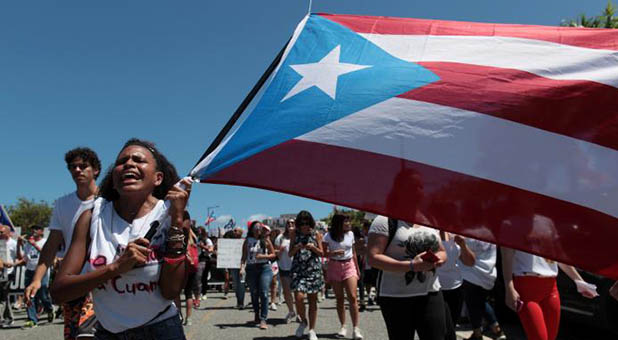Wednesday, the governor of Puerto Rico announced the island would seek to deal with its $70 billion debt crisis in federal bankruptcy court, marking the largest municipal “bankruptcy” filing in U.S. history.
How did Puerto Rico’s debt crisis happen?
During the Spanish-American War in the late 1890s the U.S. military invaded the Spanish-owned island of Puerto Rico. After the war ended, the U.S. retained control, making the islands an unincorporated territory and the residents U.S. citizens.
In 1917, Congress passed the Puerto Rican Federal Relations Act of 1917 which, among other features, gave the territory “triple tax exemption” (i.e., local, state and federal) on most Puerto Rican bonds. Because the bonds were exempt regardless of where the bondholder resides, this exemption made Puerto Rican bonds attractive to investors both on the island and the mainland of the U.S. The local and territorial governments of Puerto Rico were able to sell bonds as a way to balance the territory’s budget and fund municipal services.
Additionally, the island benefited from tax breaks for corporations that moved to the island. From the 1970s to the 1990s, numerous industries—from clothing to pharmaceuticals—moved operations to Puerto Rico. But Congress allowed those tax incentives to expire in 1996, which lead to an exodus of companies (and people) back to the mainland. This decline, combined with an economic depression that has lasted 11 years, reduced Puerto Rico’s tax base, leading government officials to issue even more debt to cover the shortfall.
In 2014, the debt-to-GDP ratio reached 68 percent, which drove concerns the island would default on the bonds it had issued. In February 2014, three American credit rating agencies downgraded the government’s debt to non-investment grade (i.e., “junk”) which made borrowing by the government even more difficult.
About half of Puerto Rico’s budget was going to service the debt, so the territory passed a law suspending through January 2017 payments to investors holding general-obligation bonds, sales-tax securities and debt from the island’s Government Development Bank and other public agencies.
If this has been going on for years, why is it just now being resolved?
Last year Puerto Rico defaulted on a principal payment of $399 million—the island’s largest default to date. That action prompted Congress to expedite a plan to oversee the problem. In June Congress passed the Puerto Rico Oversight, Management and Economic Stability Act (PROMESA).
PROMESA created a seven-person board, appointed by the president, to oversee the island’s negotiations with creditors. The law also allowed for bankruptcy-like proceedings overseen by a federal court.
Why can’t the municipalities in Puerto Rico that issued the bonds just declare bankruptcy?
Unlike municipalities in states (think: Detroit), cities in Puerto Rico are not allowed to declare bankruptcy. The process they will undergo won’t officially be called “bankruptcy” because Puerto Rico is not part of a U.S. state and is thus legally barred from using Chapter 9, the bankruptcy route normally taken by insolvent local governments.
Is Puerto Rico’s problem similar to the financial crisis in Greece?
Yes and no. Some of the underlying problems (e.g., a weak tax base) are similar, but a major difference is that most of Greece’s debt is held by foreign countries while Puerto Rico’s debt is owned by individual investors, pension funds, etc. That makes it more difficult for the default to be absorbed.
Additionally, if Congress allows a default by a U.S. territory it could have an effect on state and municipal bonds, causing bondholders to seek higher yields to offset the risk. This would mean that state and city taxpayers would have to pay more to finance local projects.
What is President Trump’s position?
Last week on Twitter President Trump wrote: “Democrats are trying to bail out insurance companies from disastrous #ObamaCare, and Puerto Rico with your tax dollars. Sad!”
Other than citizens of Puerto Rico, who will be most affected by a default on the bonds?
American investors, particular older people and retirees. The bonds were considered a safe investment, so they are held by a large number of mutual funds. Over 20 percent (377 out of 1,884) of bond mutual funds own Puerto Rican bonds, according to data from Morningstar.
Because older people and retirees tend to hold more of their money in bonds, a default could affect their savings or retirement income.
Joe Carter is a Senior Editor at the Acton Institute. Joe also serves as an editor at The Gospel Coalition, a communications specialist for the Ethics and Religious Liberty Commission of the Southern Baptist Convention and as an adjunct professor of journalism at Patrick Henry College. He is the editor of the NIV Lifehacks Bible and co-author of How to Argue like Jesus: Learning Persuasion from History’s Greatest Communicator (Crossway).
This article was originally published at Acton.org. Used with permission.
See an error in this article?
To contact us or to submit an article





















